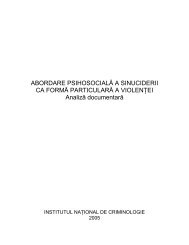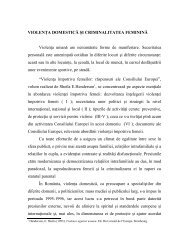REVISTA DE CRIMINOLOGIE, CRIMINALISTICĂ ŞI PENOLOGIE Nr ...
REVISTA DE CRIMINOLOGIE, CRIMINALISTICĂ ŞI PENOLOGIE Nr ...
REVISTA DE CRIMINOLOGIE, CRIMINALISTICĂ ŞI PENOLOGIE Nr ...
Create successful ePaper yourself
Turn your PDF publications into a flip-book with our unique Google optimized e-Paper software.
sus, că o eventuală legalizare a consumului de droguri nu ar putea avea decât consecinţe negative asupra individului prin<br />
prisma efectelor pe care le poate produce o atare soluţie legislativă.<br />
INSTITUŢIONALIZAREA PROGRAMELOR <strong>DE</strong> <strong>DE</strong>ZVOLTARE A INTELIGENŢEI EMOŢIONALE.<br />
METODĂ <strong>DE</strong> PREVENIRE A <strong>DE</strong>LINCVENŢEI JUVENILE<br />
Simona Mihaiu<br />
Sociolog<br />
Specializarea Devianţă Socială şi<br />
Criminalitate<br />
„Spiritul copiilor nu este un vas pe care avem să-l umplem<br />
ci este o vatră pe care trebuie s-o încălzim”.<br />
O.Gréard (1828-1904)<br />
Abstract:<br />
A very consistive part of the advanced strategies in the juvenile delinquency field is based on reducing effects, but not on<br />
causes, which is reflected in the Romanian society of today. A group of American researchers have been moving around the<br />
1990s development theory of emotional intelligence in the children personality, socialization and socio-professional<br />
development. This strategy was successful in preventing juvenile delinquency in countries where it had been imposed, but<br />
socio-economic situation in our country could hold back such a program that accesses all sections of society. Therefore, in<br />
Romania, emotional literacy can be achieved through pedagogical assistance centers of primary and secondary schools.<br />
Conditions are for the M.E.C. to ensure the establishment of such offices in all schools and to support the participation of<br />
specialists in training and teaching emotional intelligence. Currently, under law 84/1995, pedagogical assistance centers are set<br />
up only in educational institutions in which at least 800 students are enrolled. Even if the Romanian education raises many<br />
priority issues, we should keep in mind that this measure may have contributed to the reduction of a major social problem -<br />
juvenile delinquency.<br />
Key words: juvenile delinquency, social problem, prevention, emotional intelligence, institutionalization.<br />
1. Consideraţii generale<br />
În prezent, delincvenţa juvenilă privită din perspectiva globală se caracterizează atât printr-o creştere îngrijorătoare a<br />
numărului de minori implicaţi cât şi prin natura şi gravitatea infracţiunilor comise - fapt ce ne îndeamnă să privim această<br />
problemă socială ca fiind o reală ameninţare pentru prezentul şi viitorul nostru. Vagabondajul, cerşetoria, furturile, violul,<br />
hărţuirea sexuală, consumul de alcool şi alte droguri, comportamentul de bandă reprezintă „modalităţi de viaţă” pentru foarte<br />
mulţi dintre copii, pentru prea mulţi, având în vedere costurile imense pe care le plătesc şi prin care îşi limitează propria<br />
existenţă.<br />
Vom defini delincvenţa juvenilă ca fiind “ansamblul conduitelor aflate în conflict cu valorile ocrotite de norma penală”. 40<br />
Pentru a exclude ambiguităţile generate, cel puţin parţial de către diversele perspective din care este privit acest fenomen<br />
40<br />
Dan BANCIU, Sorin M. RĂDULESCU, Evoluţii ale delincvenţei juvenile în România. Cercetare şi prevenire socială,<br />
Editura Lumina Lex, Bucureşti, 2002, pag.80;




